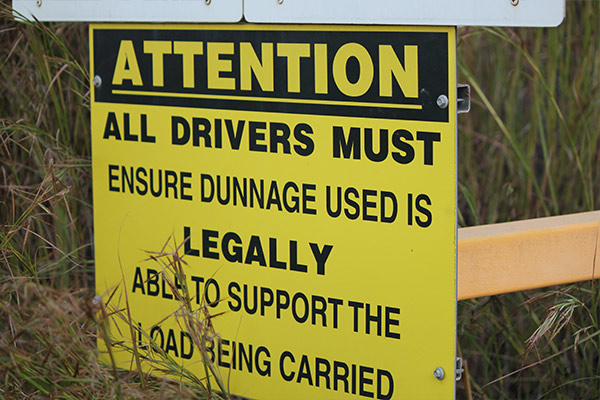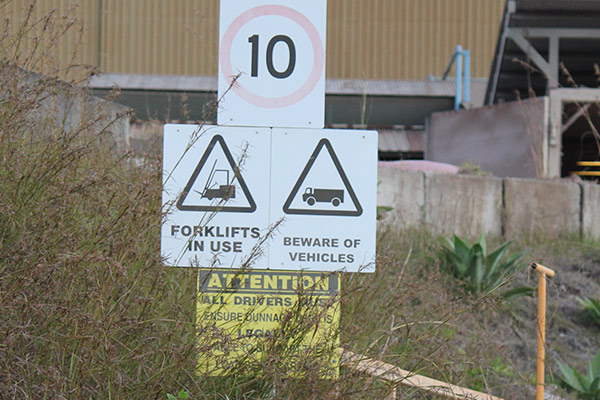Poor standards led to the death of an innocent motorist, but the loader received a small fine while the truck driver delivering the freight was charged with manslaughter
A truck driver was put through the legal wringer after freight fell from a rig he was driving and killed a woman, while the company responsible for loading the vehicle received a small fine.
New South Wales Police threw the book at driver Basil White after a steel girder slid off his truck and collided with the passing vehicle of Leonie Darling in 2011.
Darling was travelling on the Mitchell Highway near Bathurst when the incident occurred and died as a result.
White, who was driving for Robbie Walker Transport when the accident happened, was charged with dangerous driving occasioning death, driving in a dangerous manner and manslaughter by criminal negligence.
He was found not guilty and cleared of all charges in April this year.
KGB Protective Coatings was the party tasked with loading the truck.
In a separate court case, the Roads and Maritime Services (RMS) prosecuted it for a load restraint breach under chain of responsibility (COR).
During proceedings, it was revealed KGB used untrained staff to load the truck.
“The KGB staff who placed the load onto the vehicle were under the supervision of KGB,” justice Peter Garling says.
“KGB staff were not trained in load restraint.
“KGB staff did not measure the dimension of the load.”
He found the company’s actions caused Darling’s death and KGB accepted no responsibility for its actions, despite pleading guilty to a load restraint offence.
“If the load had been properly secured, such that it was unlikely to fall, as the legislation required, then Ms Darling’s death would not have happened,” Garling says.
“I can only conclude that there was a failure by the company to address its legal obligations with respect to load restraint.”
Garling convicted KGB and fined it $18,150, along with ordering the firm to pay $25,000 to the RMS in court costs.
It faced a maximum fine of $27,500.
“Except for the plea of guilty to the offences, there is no evidence that the company has accepted responsibility for its actions, nor has the company, other than by its plea, acknowledged any injury, loss or damage caused by its actions, nor is there any evidence that it has made any reparation for such injury, loss or damage as the statute requires,” he says.
“I am not persuaded on the balance of probabilities that the mere entry of a plea indicates any remorse on the part of the company.”
KGB used softwood timber as dunnage to support the load but the wood was defective and compressed during transit, causing the girder to slide off the truck.
Robbie Walker Transport supplied the wood but did not know it was defective.
The RMS prosecuted the company and its owner, Robert John Walker, for a load restraint breach under COR.
Both pleaded guilty.
The company was convicted and fined $16,500, while Walker himself was convicted and fined $900.
They were ordered to pay the RMS $20,000 in court costs.
The court was told the now-retired Walker had been involved in the transport industry since 1970 and that prior to the 2011 incident had never breached road safety or load restraint requirements.
“In his affidavit Mr Walker expresses deep remorse for the offence, and heartfelt sympathy for the family of the unfortunate Ms Darling,” justice Peter Hidden, who sentenced Walker, says.
“He adds that he accepts full responsibility for the incident, and is ‘personally very affected’ by it.
“Indeed, this tragedy was a material factor in his decision to terminate his involvement in the transport industry.”
 |
|
KGB Protective Coatings was tasked with loading the truck.
|
Lowly penalty
Prior to fining KGB, justice Garling emphasised the need for the penalty to send a message to other companies in the transport supply chain.
“This is a case where, given the nature of the offence and the fact it occurred on a public road, the principle of general deterrence must play an important but necessarily proportionate role,” he says.
“In these circumstances, the proper punishment of the company will operate as a general deterrence for other companies who consign and load goods onto heavy vehicles for transport on the public roads of NSW from committing breaches of transport legislation, in particular of load restraint requirements, and thereby enhance road safety.”
However, the RMS believes the penalty is too low to deter others from breaching their obligations.
“The consignor was fined $18,150 out of a possible maximum of $27,500,” it says.
“It is doubtful whether this amount would have had a meaningful deterrent effect among off-road parties in the road freight industry.”
KGB’s actions amounted to a severe risk breach — the highest-level offence under COR.
The RMS tried to prosecute KGB for the COR breach as a loader and a consignor — thereby exposing it to multiple fines — and KGB pleaded guilty to both offences.
However, Garling ruled both offences were the same and that he was only permitted to impose a penalty for one offence.
He convicted and fined KGB for a loading offence and then applied a conviction only for breaching its duties as a consignor.
“The breach of the Road Transport [Act] legislation, namely, that the load was not properly secured, is identical with respect to each of the two offences,” Garling says.
“The only difference between the offences is the capacity in which the company is charged — in one offence as the consignor, in another offence as the loader.”
 |
|
Warning sign in the KGB driveway.
|
Procedures questioned
KGB put in place a new loading procedure after it was prosecuted for the load restraint failure.
However, court documents show Garling has serious misgivings about whether the procedure will be effective.
In his written judgment, Garling says the single page document directs KGB employees to avoid involvement in any loading procedure, as opposed to pointing out steps they can take to ensure vehicles they load or consign do not breach road transport requirements.
“Paragraphs four, five and six of the document directly relate to not taking any action and, in essence, seek to ensure that the company no longer undertakes loading, and thereby avoids any responsibility at all for the restraint of a load on any vehicle which leaves the company’s premises,” Garling says.
“I am not persuaded on the balance of probabilities that this new procedure will avoid any conduct which may constitute the one or more offences in the future.
“It may provide a basis for the company being able to mount a defence to any allegation that it has been in breach of its obligations as created by the statute, but I am not persuaded that such steps as have been taken to rectify the procedure which previously existed will mean the company is unlikely to commit any further offences of the kind with which it is charged.”
 |
|
A truck driver’s eye view of the driveway into KGB — the dunnage sign is obscured by long grass.
|
Slack procedures
Potentially more parties could have been prosecuted for the death of Darling, but they managed to avoid the courtroom because the RMS could not establish a paperwork trail.
Investigators identified six parties — including those charged — involved in the transport of the girders.
“The transport of the steel girders had been arranged through a chain of phone calls and subcontractors,” the RMS says.
“There was no process of induction or communication to confirm the skills and experience of the final subcontractor and driver.
“There was nothing done to confirm how the load was to be restrained. There was no planning for the driver to take a rest break.
“In the absence of any written agreement or other transport or journey documents, it was not possible to identify whether the conduct of other parties contributed to the load restraint failure.”
The RMS says there was a separate consignee and two other transport businesses that subcontracted the work or referred the job on.
“There was no communication about the nature of the load, its restraint or the time available for its delivery,” it says.
The RMS believes the outcome could have been different if the National Transport Commission’s (NTC) proposed changes to COR were in place.
The NTC wants to replace existing prescriptive COR standards with a general duties requirement.
The change will impose a broad safety obligation on parties but will allow them to determine how they will comply with COR.
“Under a general duties regime any one of these omissions [in the Darling case] would be a breach of the duty to ensure safety,” RMS says.
“It would not be necessary to have a crash such as this to establish the offence.
“This obligation would focus the minds of those in the transport industry on managing safety risks and thereby on prevention of incidents such as this.”
The RMS says there should have been greater effort to ensure the load was restrained properly and that correct dunnage was used to prevent the load from shifting.
“The police clearly formed the opinion the driver was reckless, charging him with manslaughter,” it says.
“The driver was not the only person who could have done more to prevent this crash.”
ATN contacted KGB but the company, through its legal representative, declined to comment.


